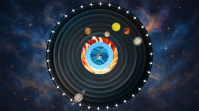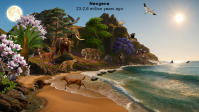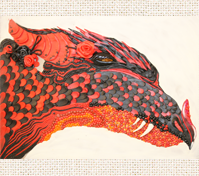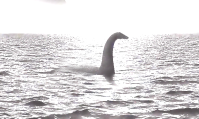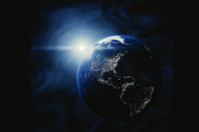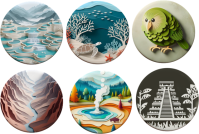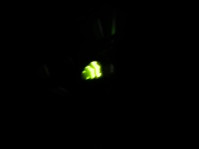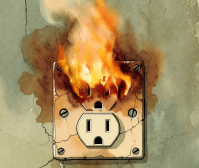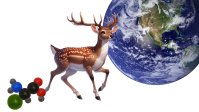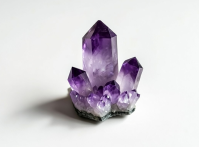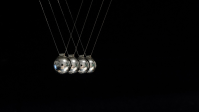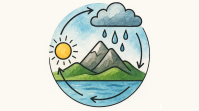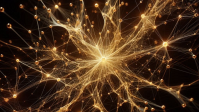Natural Science
How our Universe arose, how life appeared on Earth, how human civilization developed, and in what relationship with nature people have now - we will try to answer these questions here. The Earth is our shared planet on which we all stand with our feet. Our spaceship, speeding through space and time. The fate of the Earth is our common fate.
Let's study how this ship's mechanisms work so as not to break them, so that humanity can live happily ever after.
-
Platform: PC, Windows
-
Authorization (the "Login" button in the upper left corner) allows you to monitor your progress.
Сurriculum
-
The Genesis of the Universe
Start over! Look on a cloudless night at a dark sky. What can you see there? You might say, "stars." But the space between them is also not empty. It is filled with invisible waves and atoms of transparent gases and inaudible sounds. Just as detectives can find a criminal by insignificant traces - a fingerprint or a piece of clothing, so scientists, exploring the visible and invisible phenomena of the Cosmos, can restore the history of the Universe. Until we can reproduce the Universe's birth during the experiment, the Big Bang remains an unproven hypothesis. However, most scientists believe that this is the way our world appears.
In this lesson, we will try to understand the essence of the Big Bang. We also learn how stars are born and die.
- Earth and Cosmology
The universe began with the Big Bang about 13.7 billion years ago.
The first stars were born and died. Their dust eventually gathered into the protostar, from which the Sun and the planets, including our Earth, emerged. Now we have a clear picture of the Earth and the solar system. But was it always like this? No way! Let's explore the history of how we understood the world. It is long and complex. We will see how people gradually moved from the first simple ideas to a precise model of the world.
"From Flat Earth to Modern Cosmology – How Humanity's View of the World Changed" on YouTube
- Evolution of Life on Earth
Last time, we settled on the fact that our Earth turned out to be a very prosperous planet - not too cold, not too hot, not too small, and not too big, our Sun is good, and its location is in the best part of the galaxy. And how could life not appear on such an incredible planet?However, how it happened is one can only guess. But life arose and began to develop quickly. In this lesson, we will examine the evolution of living creatures.
"4 Billion Years of Life on Earth in 2 Minutes " on YouTube
- Mythical Creatures
There is a saying, "The dream of reason gives rise to monsters." The brain is arranged so that if a person does not know or understand something, it can fill the knowledge gaps haphazardly.
Now we know which living organisms exist and which do not, and understand how they are constructed. But in ancient times, there were very few scientists (and much fewer people). They did not know much about the world, and even the most intelligent and educated were sometimes compelled to write descriptions of animals only from paraphrases of "eyewitnesses." And so, from pieces of truth and fantasies, "bestaria" appeared (in Latin, Bestia means "beast") - collections of zoological articles with exciting content.In this lesson, we will get to know some drastic mythical monsters.
-
Cryptozoology
Secrets and riddles will always attract people. Elephants, rhinos, and orangutans live on earth, hummingbirds fly, whale sharks swim - many fascinating creatures. But the heart never stops in anticipation of something interesting, as when we hear the word "yeti". Or the Loch Ness Monster. Let's read the stories of these and other mysterious creatures (they are called "cryptids") and try to figure out if there is any truth in them.
-
Practical Inventions of HumankindWe are surrounded by many useful things that we use every day and get used to, so we stop noticing them. But everything, absolutely everything, was once invented. Before that, it did not exist. There was no soap, no buttons, and even no clothes at all. A hairy body protected from the cold, and a digging stick replaced all tools.What and when were invented by humankind? We will briefly get to know each other in this lesson.
-
Key Steps Behind Scientific Discoveries
I won't tell you that. Just a hint, and leave it for you to guess.
-
Biosphere
In this session, we will look at an ecosystem, how it relates to the biosphere, and what the biosphere can become over time.
-
The Interaction Between People and Nature
In this lesson, we will learn how the very first people interacted with nature and how it is now. And will practice predicting the consequences of the economic activities of people. -
IUCN Red ListThe achievements of human civilization can be incredible. Among them is a victory over diseases that used to be fatal and claimed millions of lives. And space flights. And art - enchanting music, beautiful paintings, fascinating and wise books. But some “achievements” are not good at all, and we can not be proud of them — for example, records in the Red Book. The Red Book is a book about animals and plants that may soon disappear from our world forever.How and why animals die - we learn from this lesson.
-
An ecological disaster has engulfed the Earth. Tons of garbage litter the land, even drifting through near-Earth space. Thin films of oil coat almost every puddle, where children play—sometimes with two hands, sometimes with three.Forests no longer exist. Only the elderly recall how their grandparents once wandered among the trees, searching for mushrooms and listening to nature. The lakes and rivers are poisoned, and drinking water comes only from filtered recycling systems.Thankfully, this future has not arrived yet. And I hope it never will, as long as we protect the last untouched corners of the wild. That is why we have specially designated areas—nature reserves—created to shield these ecosystems from destruction. Today, we’ll explore what they protect and from whom they must be defended.
-
Understanding the Natural Phenomena
Throughout our lives, we are surrounded by various natural phenomena. You want to understand what's happening around you, don't you? Of course, you can ask someone or search online. But isn't it even more satisfying to figure it out on your own? Let's practice that skill today. -
Where Does the Soil Come From
If you dig up the soil, you will find only last year's leaves. Where do the rest go? And anyway, where does all the garbage that falls go? -
Bioindicators
Discover how the whispers of the wild can guide us to imminent rainfalls, hidden springs of pure water, and the earth's treasures. Our lessons unveil the art of interpreting signals of bioindicators.
-
Surviving Everyday Life
We talked a lot about how to make animal life safer and happier. But man is also an animal (at least from a biological point of view) and needs protection and care. Let's get started today by looking at various dangerous situations that happen all the time (or vice versa, rarely), and from which it would be nice to leave alive and unharmed.
-
Biological Laws
Yes, yes, biology has its laws, the implementation of which is mandatory for everyone. Yes, in principle, to fulfill them, you do not need to do anything on purpose; you just need to be alive. -
Levels of Organization
Look around you. What do you see? Table, chair, closet? Other people? Maybe a window and trees outside the window? Whatever you see will be only a small part of the world that surrounds us. And not because the rest of the part is far away. Something could be right under your nose - bacteria, for example, but you can't see it because it's so small! Not to mention molecules and atoms. Big things are also impossible to see. If you want to see the biosphere, for example, then even if you reach the very horizon, you will still not see it, because while you are walking towards a distant part of it, you move away from the starting point and stop seeing it. This is how the world around us works. Ready to figure out how it all works?
-
Parts of Flowering Plants
In this lesson, we will explore the key characteristics of flowering plants that allow them to be identified: the structure of the flower, inflorescences, fruits, stems, and leaves, and we will also get acquainted with the systematic position of flowering plants. Don't worry, it may sound dull, but such a simple lesson has prepared many unexpected things for you. For instance, did you know that a cucumber is a gourd, a pear is an apple, and cone berries grow on the gymnosperm juniper? If not, dive in.
-
Stones and Minerals Identification Lab
Inevitably, each of you at home has some minerals. Considering them is very interesting. Today, we will try to learn to see the minerals' features and where they come from.
-
"Physics" in Greek translates to "nature". Therefore, there's no need to go far to find physical phenomena. All material bodies around us obey the laws of physics. We might not notice them because they seem ordinary and don't catch the eye. But today, I will try to create a little miracle for you and show several physical experiments that, despite their simplicity, vividly demonstrate the principles and laws of the universe.
-
Chemistry Is All AroundChemistry - this word sounds scary, incomprehensible, and damn entertaining. Although chemistry as a science emerged only in the 16th–17th centuries, people have been conducting chemical reactions since the beginning of our history. They knew how to turn clay into bricks, smelt ore into iron, and sand into glass, cook soap from fat and ash, make yogurt from milk, and brew beer from grain. But all this was done blindly. Having the first success, people repeated the same actions mechanically to get the same result.However, science arises where fortune-telling disappears, and an accurate forecast arises. In this lesson, we will talk about how chemistry was born, how chemical elements were discovered, and how you can find these elements in your home. And let's experiment a little.
-
Water CycleIf your faucet isn’t tight,
Water runs both day and night.
An ocean might escape — oh no!
Down the pipes it’s set to go!
Twist that handle, save the flow.
Let the water waste be low!Of course, the tap needs to be closed. The question is - can an ocean flow out of it? -
How Do We Think
Thinking is how we understand, explore, and interact with the world. It’s like building a map in your mind that helps you figure things out. But what happens when your 'map' doesn’t match what’s happening? That’s where a mental workout comes in handy!In this lesson, we’ll dive into the basics of how our brains work when we think—breaking big ideas into smaller building blocks called 'thinking operations.' And here’s the fun part: you’ll solve cool puzzles and challenges where these thinking skills come to life. It’s biology, it’s psychology, and it’s all about sharpening your brain while having a little fun. -
Bionics Is the Science of the Future
Bionics is a recent but up-and-coming science. It studies nature to apply this to human inventions. So we can say that this kind of industrial espionage, only no one is offended. In this lesson, we will learn interesting engineering solutions found through nature observation.

